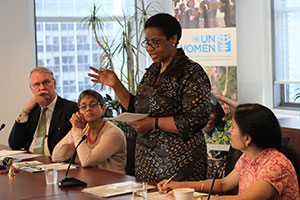New Executive Director meets with civil society members in New York and pledges close collaboration
Date:
Just seven days after having been sworn into office, the new Executive Director of UN Women, Phumzile Mlambo-Ngcuka, welcomed civil society representatives based in New York at UN Women Headquarters and pledged strong collaboration. She acknowledged the key role of civil society in making progress for human rights, in ensuring a successful outcome at the 57th session of the Commission on the Status of Women, as witnessed in the agreement to end and prevent violence against women and girls, and in pushing for the creation of UN Women.

“My vision is for close and non-bureaucratic partnership in which the focus is on unity and solidarity for action,” said Ms. Mlambo-Ngcuka.
Addressing the group of some 50 representatives, the Executive Director pledged to maintain an activist approach and appealed for solidarity, joint fundraising and partnership to enhance accountability to benefit women and girls around the world.
She urged civil society to work with UN Women and others to make sure that women’s rights, empowerment and gender equality are central to the post-2015 development agenda, as outlined in UN Women’s paper on the stand-alone gender goal. She highlighted the importance of moving from words on paper to concrete action and the need to reach out and engage grassroots women.
During their discussion, members of civil society stressed the need to ensure that gender equality and women’s empowerment are at the core of the post-2015 process. They also emphasized the importance of grounding women’s issues and agendas, including sexual and reproductive rights, in the human rights framework. They expressed concern about challenges to the universality of human rights and attacks on women human rights defenders. A moment of silence was observed to mourn the loss of aid workers just killed in Afghanistan, of whom three were women working for the International Rescue Committee.
In closing, Ms. Mlambo-Ngcuka called for strengthened alliance-building across sectors to protect hard-won gains and to keep moving forward.
UN Women supports civil society organizations to work with UN Member States to develop and implement policies, and engage in vital political discourse on gender equality, women’s human rights, sustainable development and peace and security. The organization partners with diverse and geographically representative civil society organizations and networks to achieve strategic goals.
UN Women has established Civil Society Advisory Groups (CSAGs) at global, regional and national levels to serve as mechanisms that strengthen partnerships and outreach to civil society.